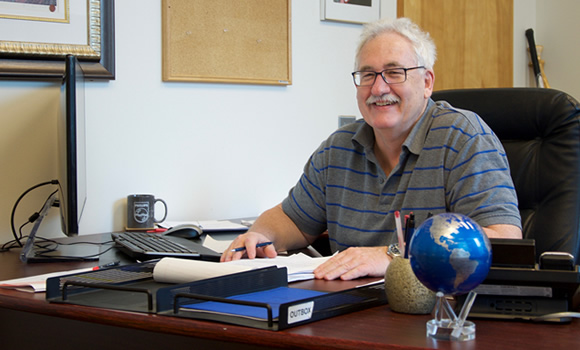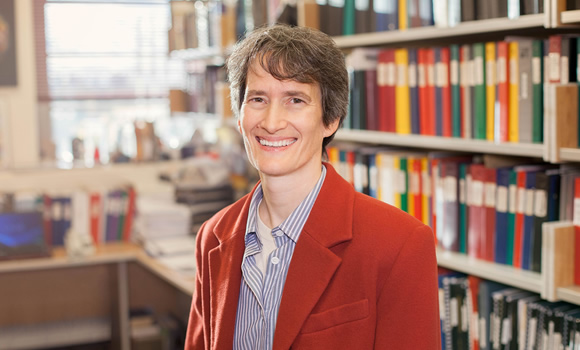Climate change is one of the world’s biggest challenges and researchers are bringing a wide range of disciplinary perspectives to bear on the problem, including those in the Department of Earth Sciences and the School of the Environment.

Grant S. Henderson
Acting Chair, Department of Earth Sciences
In the upcoming year we will be working hard to better integrate our traditional resource-based programs such as the geology specialist, with those recently added in the environmental and climate change areas (e.g., Earth and environmental systems major). We also expect to see increased international collaboration with colleagues across the globe in areas such as climate change, planetary geology, ocean sciences, as well as, fundamental research on the physics, chemistry and dynamics of Earth and planetary processes.
Arctic research is key
Research on the Arctic will become an increasingly important area both from an environmental and resource perspective. Canada is a resource-based economy and will remain so for the foreseeable future. Earth sciences will continue to play a major role in identifying and supplying the resources — ore, gas and oil deposits that remain necessary until green energies become more viable — as well as training high-quality graduates to meet the increased demand for raw materials in the next decade. Undergraduates entering our program this year will be well-poised upon graduation for the next commodity boom and future employment opportunities not only in Canada but around the world.
Pioneer of Plate Tectonics: Legacy of J. Tuzo Wilson
2016 marks the 50th anniversary of J. Tuzo Wilson’s benchmark Nature paper, “Did the Atlantic close and then re-open?” In recognition of the important contributions that this U of T graduate made to developing the theory of plate tectonics, the Arthur Holmes meeting of the Geological Society of London is hosting a major international celebration entitled, “The Wilson Cycle: Plate Tectonics and Structural Inheritance During Continental Deformation.”
We will continue to improve opportunities for international collaborations and joint international graduate student research, and ensure students have hands-on opportunities to learn from leaders in the field and on state-of-the-art equipment.
Kim Strong
Director, School of the Environment
Environmental challenges are everywhere, from the local to the global, and the need for deeper understanding, evidence-based decisions, and sustainable solutions continues apace.
Paris climate change conference + new Canadian federal government = action on carbon pricing?
The recent agreement at the COP21 Climate Change Conference in Paris, together with a new federal government in Canada, signals that real action on carbon pricing is in the air. This topic was tackled at the School of the Environment’s Minden Symposium in fall 2015, where delegates agreed that a co-ordinated federal-provincial approach is essential for an effective national climate policy. Senior Lecturer Douglas Macdonald has developed workable approaches and is encouraging the federal government to ensure that the provinces take significant new action matched by new federal policies, to negotiate an equitable sharing of the cost of emission reductions.
Monitoring and measuring urban emissions will be key factors in helping Canada attain its goals. Toronto has committed to ambitious emissions reductions and Assistant Professor Debra Wunch is helping by setting up a mobile measurement system to monitor atmospheric greenhouse gas abundances in the city, as well as a new station in the boreal region of western Canada. Wunch is also making use of data from the new Orbiting Carbon Observatory (OCO-2) which will help us distinguish global sources and sinks of CO2 with a spatial and temporal precision previously unattainable.
Global poverty and religious worldviews are part of the equation, too
Increased linkages between climate change and global poverty have increased awareness of climate change as a moral issue. Such concerns were raised by Pope Francis in his Fall 2015 visit to the UN and in his encyclical on the environment, Laudato Si’. Associate Professor Stephen Scharper is exploring these dimensions as he examines how religious worldviews are impacting both environmental perceptions and policy.
Increasing attention is also being paid to the ecological impacts of climate change. Beyond its effects on ecosystem functioning and species interactions, climate change is affecting the physiology of organisms. In the next few years, Assistant Professor Njal Rollinson will try to figure out why these changes are occurring by examining trade-offs between growth and reproduction under different climactic regimes, shedding light on why optimal body size might be expected to change with temperature.
Not just CO2 — it’s urbanization, population growth, agricultural intensification, economic globalization and all that stuff we make and buy
Of course, environmental change is also being created by urbanization, population growth, agricultural intensification, economic globalization and the mass production and consumption of commodities. These forces are exerting pressure on global ecosystems that challenge our existing governance arrangements, and, in turn, catalyze changes in social and political relationships. Three broad trends can be discerned in this area: the intersection of indigenous rights, social justice, and environment; a re-imagination of citizenship and borders; and innovation and technological change. With her research on non-conventional energy resources, commodities and technologies, Assistant Professor Kate Neville is immersed in addressing these questions.
Another growing area is the impact of environment on human health. Assistant Professor Clare Wiseman is helping inform Canada’s Chemicals Management Plan on priority metals contained in urban road dust. The focus is on metals contained in fine particles that can undergo long-distance transport and also penetrate indoor home environments and be breathed deep into the lungs. An examination of the composition of dust deposited in roadside environments is crucial to determine its impact on local air and water quality, and on human health.
Not just research; universities are powerful change agents for sustainability
Many environmental issues can be embedded within a sustainability framework. Trends in this area include the role of cities, the role of information technologies and social/digital media, and, the shift from selling products to selling/renting services. Professor John Robinson is examining how to make buildings, neighbourhoods and cities contribute to improving environmental and human well-being, and how to engage politically significant numbers of citizens in exploring the outlines of a sustainable future for their community. Robinson’s interests also include the role of art and the interpretive social sciences and humanities in the sustainability transition. Universities are ideally placed to play a key role in this transition, serving as living labs and agents of change that can support society’s transition to a sustainable future. With this in mind, the School of the Environment is in the early stages of developing a new Master of Environment and Sustainability degree that responds to the growing interest of students and the growing needs of society in this area.


